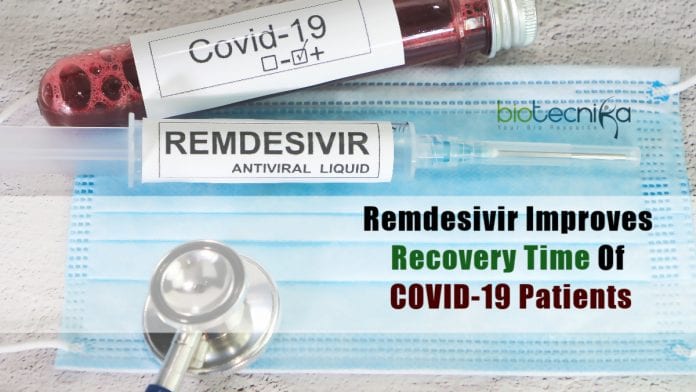Remdesivir Improves Recovery Time Of COVID-19 Patients
According to a report released in the New England Journal of Medication, the experimental antiviral remdesivir transcends to the standard of care for COVID-19 treatment. The data from the ACTT – Adaptive COVID-19 Treatment Trial contributed to the primary evaluation. The study is funded by part of the National Institutes of Health – the NIAID (National Institute of Allergy and Infectious Diseases). The controlled trial was randomized and enlisted COVID-19 adults hospitalized with lower respiratory tract involvement (typically modest to severe disease condition). Researches discovered that remdesivir was most helpful for hospitalized people with extreme disease who needed oxygen supplement. Findings of benefits in other subgroups of patients were much less definitive in this initial evaluation.
The research enlisted 1,063 participants in 10 nations in 58 days and the study began on 21, Feb 2020. Individuals provided informed grant to participate in the test. The patients were arbitrarily assigned to obtain a 10-day course of the antiviral remdesivir intravenously, developed by Gilead Sciences, Inc. and local standard care, or a placebo and local standard care. Neither the investigators nor participants knew who was receiving a placebo and who was receiving remdesivir as the
trial was double-blind.On April 19, 2020, the trial closed enrollment. The preliminary analysis was shared with NIAID by an independent data and safety monitoring board overseeing the trial after reviewing the data on April 27, 2020, while participant follow-up was still ongoing. Due to the conclusions for both patients currently in the study and for public health, NIAID quickly made the primary results of the study. The outcomes of the study were released in the New England Journal of Medicine.
The study notes that a shorter or improved recovery time was seen in COVID-19 patients who received remdesivir than those who received a placebo. Being medically stable enough to be discharged or getting discharged from the hospital was defined as the recovery in this study. For the patients treated with remdesivir the median recovery time was 11 days whereas for those who received a placebo took 15 days. The outcomes are based on an analysis of 1059 participants involving 538 who received remdesivir and 521 who received placebo and the findings are statistically significant. Using an eight-point ordinal scale ranging from fully recovered to death, the clinical status of the patients was tracked daily by the clinicians. The probability of improvement in the ordinal scale was higher in the remdesivir arm than in the placebo arm as per the clinical status between the study arms compared on day 15. With a 14-day mortality rate of 7.1% for the group receiving remdesivir versus a placebo group with an 11.9% mortality rate, the outcomes of the trial suggested a survival benefit. But, the mortality difference was not statistically significant.
Yet, as per the authors, the outcomes support remdesivir as the standard therapy for hospitalized COVID-19 patients requiring oxygen supplement. However, they note that at 14 days the mortality rate of 7.1% in the remdesivir arm indicates that, to continue to improve clinical outcomes for COVID-19 patients there is a need to evaluate antivirals with other therapeutic agents. NIAID began ACTT 2 – a clinical trial evaluating a combination of remdesivir and baricitinib – an anti-inflammatory drug, compared with remdesivir alone.
Author: Sruthi S






























